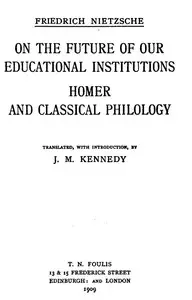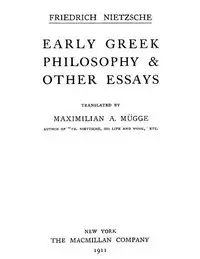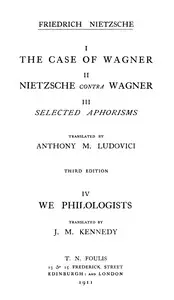"Homer and Classical Philology" by Friedrich Wilhelm Nietzsche is an academic speech that grapples with the complex world of classical philology, honing in on the legendary figure of Homer. It untangles the web of disagreements and difficulties that come with studying classical texts, especially those linked to Homer. Nietzsche dives deep into how ideas about Homer have changed through time, mirroring bigger changes in how we understand poetry and the past. Instead of just thinking about Homer as one great writer, Nietzsche encourages readers to realize that Homer's amazing stories are a blend of art, history, and cultural forces. According to him, the power of Homer's stories comes not only from one person's genius, but also from the many people and the culture that helped create these unforgettable tales.

Homer and Classical Philology
By Friedrich Wilhelm Nietzsche
Journey into the heart of literary analysis, where differing viewpoints clash over the true personality and impact of an ancient bard, challenging our understanding of history, poetry, and culture.
Summary
About the AuthorFriedrich Wilhelm Nietzsche was a German classical scholar, philosopher, and critic of culture, who became one of the most influential of all modern thinkers. He began his career as a classical philologist before turning to philosophy. He became the youngest person to hold the Chair of Classical Philology at the University of Basel in Switzerland in 1869, at the age of 24, but resigned in 1879 due to health problems that plagued him most of his life; he completed much of his core writing in the following decade. In 1889, at age 44, he suffered a collapse and afterward a complete loss of his mental faculties, with paralysis and probably vascular dementia. He lived his remaining years in the care of his mother until her death in 1897, and then with his sister Elisabeth Förster-Nietzsche. Nietzsche died in 1900, after experiencing pneumonia and multiple strokes.
Friedrich Wilhelm Nietzsche was a German classical scholar, philosopher, and critic of culture, who became one of the most influential of all modern thinkers. He began his career as a classical philologist before turning to philosophy. He became the youngest person to hold the Chair of Classical Philology at the University of Basel in Switzerland in 1869, at the age of 24, but resigned in 1879 due to health problems that plagued him most of his life; he completed much of his core writing in the following decade. In 1889, at age 44, he suffered a collapse and afterward a complete loss of his mental faculties, with paralysis and probably vascular dementia. He lived his remaining years in the care of his mother until her death in 1897, and then with his sister Elisabeth Förster-Nietzsche. Nietzsche died in 1900, after experiencing pneumonia and multiple strokes.


















